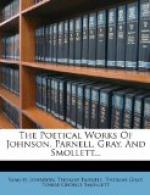“The bloom of young Desire, and
purple light of Love;”
“The terror of his beak, and lightnings
of his eye;”
“Their feather-cinctured chiefs,
and dusky loves;”
“Sailing with supreme dominion
Through the azure deep of air;”
“Beneath the good how far, but far
above the great”
“High-born Hoel’s harp, and
soft Llewellyn’s lay,”
are so often and admiringly quoted; and because, secondly, we can trace the influence of the “Progress of Poetry,” and of the “Bard,” on much of the higher song that has succeeded,—on the poetry of Bowles, Coleridge, Wordsworth, Campbell, and Shelley. Gray was not a sun shining in his strength, but he was the morning star, prognosticating the coming of a warmer and brighter poetic day.
He that can see no merit in the “Ode on the Distant Prospect of Eton College,” can surely never have been a boy. The boy’s heart beats in its every line, and yet all the experiences of boyhood are seen and shown in the sober light of those
“Years which bring the philosophic mind.”
Here lies the complex charm of the poem. The unthinking gaiety of boyhood, its light sports, its airy gladness, its springy motions, the “tears forgot as soon as shed,” the “sunshine of the breast” of that delightful period—are contrasted with the still and often sombre reflection, the grave joys, the carking cares, the stern concentred passions, the serious pastimes, the spare but sullen and burning tears, the sad smiles of manhood; and contrasted by one who is realising both with equal vividness and intensity—because he is in age a man, and in memory and imagination an Eton schoolboy still. The breezes of boyhood return and blow on a head on which gray hairs are beginning “here and there” to whiten; and he cries—
“I feel the gales that from ye blow
A momentary bliss bestow,
As, waving fresh their gladsome
wing,
My weary soul they seem to soothe,
And redolent of joy and youth,
To breathe a second spring.”
Dr Johnson makes a peculiarly poor and unworthy objection to the next stanza of the poem. Speaking of the address to the Thames—
“Say, Father Thames, for thou hast
seen
Full many a sprightly race;”
he says, “Father Thames has no better means of knowing than himself.” He should have left this objection to those wretched mechanical critics who abound in the present day. He forgot that in his own “Rasselas” he had invoked the Nile, as the great “Father of waters,” to tell, if, in any of the provinces through which he rolled, he did not hear the language of distress. Critics, like liars, should have good memories.




